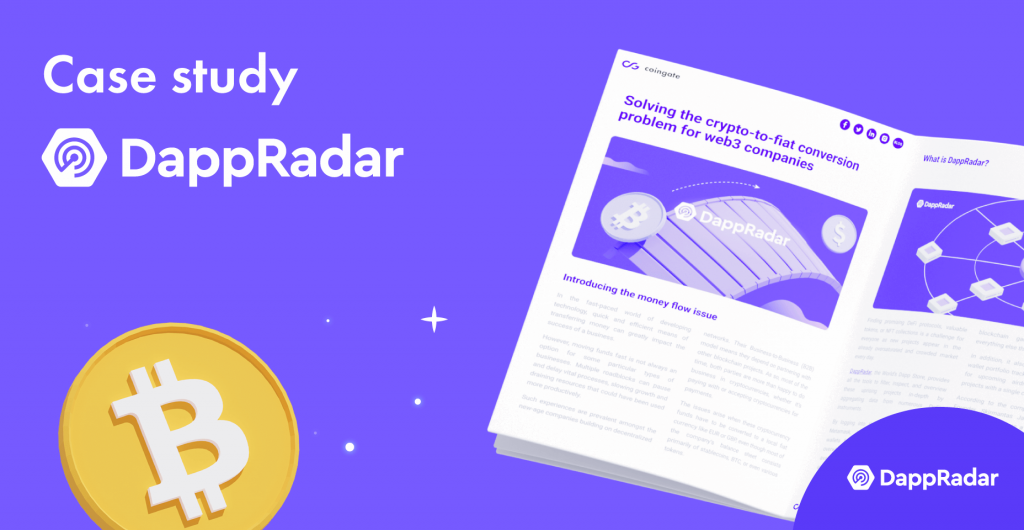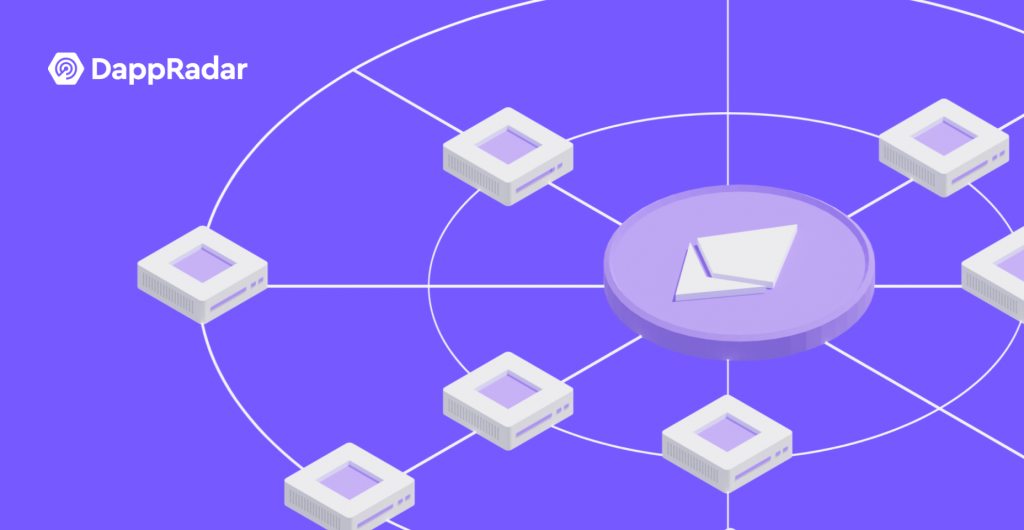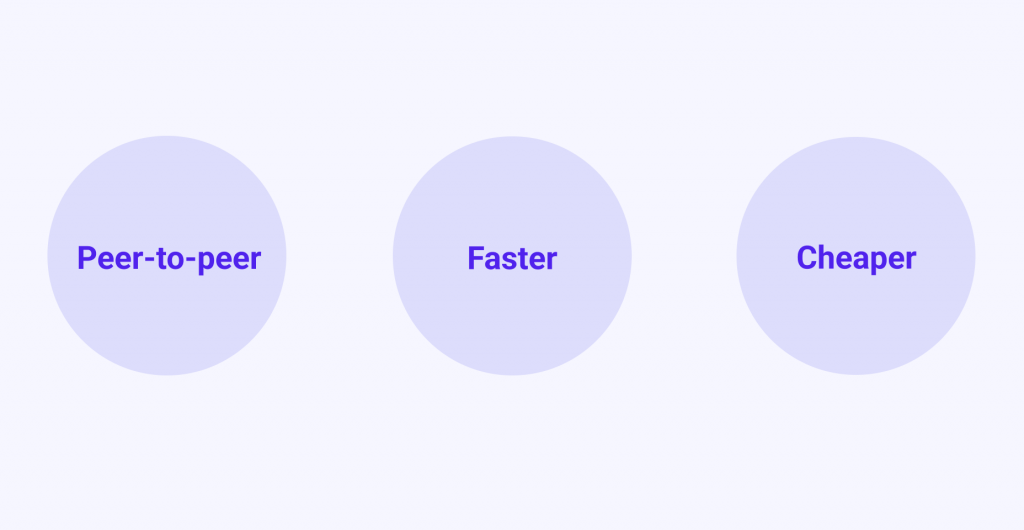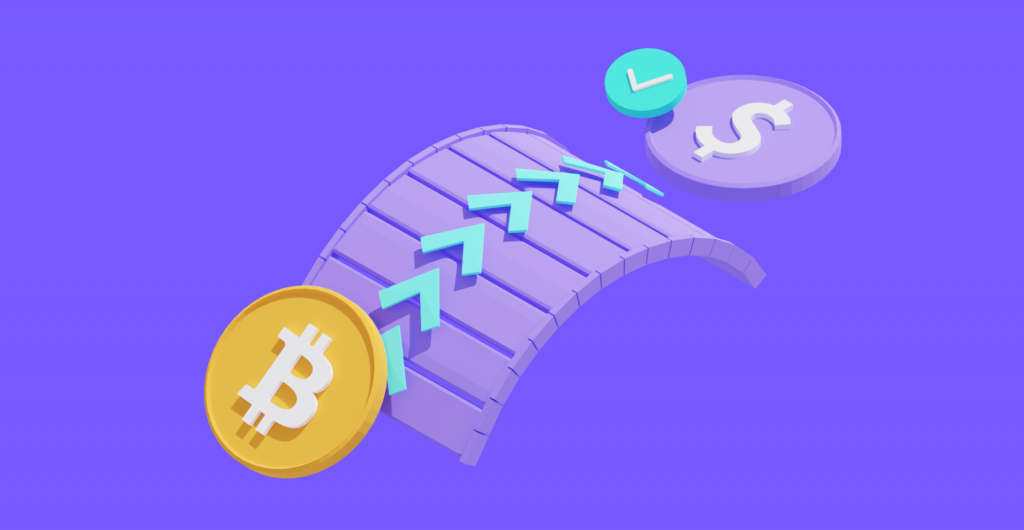Case Studies, Crypto Payments
Solving the Crypto-to-Fiat Conversion Problem for Web3 Space
Last updated: September 14, 2024 9 min read
Vilius Barbaravičius
Web3 companies do business mainly in cryptocurrencies. Yet, fiat currencies are still part of their daily operations, and it’s of utmost importance to have a seamless flow of funds between two ecosystems. However, that’s not always the case.

Introducing the money flow issue
In the fast-paced world of developing technology, quick and efficient means of transferring money can significantly impact the success of a business.
However, moving funds fast is not always an option for some particular types of businesses. Multiple roadblocks can pause and delay vital processes, slowing growth and draining resources that could have been used more productively.
Such experiences are prevalent amongst the new-age companies building on decentralized networks. Their Business-to-Business (B2B) model means they depend on partnering with other blockchain projects. As so, most of the time, both parties are more than happy to do business in cryptocurrencies, whether it’s paying with or accepting cryptocurrencies for payments.
The issues arise when these cryptocurrency funds have to be converted to a local fiat currency like EUR or GBP, even though most of the company’s balance sheet consists primarily of stablecoins, BTC, or even various tokens.
Fiat money is needed for paying salaries, covering office rent, or other operational costs, so reliance on traditional remittances becomes unavoidable.
DappRadar, a global Dapp store that brings high-quality, accurate insights on decentralized applications, is one of such companies that faced money flow challenges before. But their team has discovered a solution that has allowed the company to bypass bureaucracy and inefficiencies caused by overly complicated traditional payment networks.
What is DappRadar?
Finding promising DeFi protocols, valuable tokens, or NFT collections is a challenge for everyone, as new projects appear in the already oversaturated and crowded market every day.
DappRadar, the World’s Dapp Store, provides all the tools to filter, inspect, and overview these uprising projects in-depth by aggregating data from numerous DeFi instruments.
By logging into the DappRadar with your Metamask, WalletConnect, or CoinBase wallets for the first time, you might be overwhelmed by the number of tools available. These tools provide all the insights about the state of various DeFi sectors, rankings of decentralized applications (Dapps), blockchain games, NFT projects, and everything else that embodies DeFi.

In addition, it also serves as an NFT and wallet portfolio tracker and allows signing up for upcoming airdrops of various DeFi projects with a single click.
According to the company’s CEO and Co-Founder, Skirmantas Januškas, DappRadar started in 2018 just as a “weekend project.” But now, the scope of DappRadar covers +30 protocols and close to 10,000 Dapps. The platform has over 1 million monthly users who enjoy free access to the most accurate representation of the Dapps industry.
By now, DappRadar is not only the world’s leading Dapp store but also its own network with vast communities of contributors, curators, and consumers.
DappRadar’s business model
The company’s primary revenue source is advertisement sales and protocol listing. Most of the business deals are settled in crypto assets as the majority of DappRadar’s customers interact with the blockchain space.
As such, crypto payments are simply more convenient for both DappRadar and its clients since they are used to operating in the decentralized landscape.
Besides, crypto transfers are peer-to-peer, way faster, and cheaper than, for example, regular bank transfers. Since speed is extremely important, it makes crypto a preferred and primary way of doing business.
The need for fiat currency on a balance sheet creates money flow issues
Issues begin when a company needs fiat currency to cover operational expenses that cannot be paid off with cryptocurrencies. As the experience of DappRadar suggests, exchanging crypto for fiat can swiftly become time-consuming and burdensome for several reasons.
Paying high fees on centralized exchanges
To turn cryptocurrencies into a local fiat currency and place the funds in a bank account, a business has to convert them using a centralized exchange. However, centralized exchanges charge high transaction fees, especially when trading in large volumes.
Also, additional fees can add up quickly. For example, initiating a withdrawal of funds to a bank account might cost even more than the conversion itself.
Not only is this process costly, but it also might be slower than expected due to waiting times imposed by the exchange and, more importantly, the receiver bank’s never-ending curiosity about your crypto-related activities.
The burden of recurring and unexpected compliance procedures
KYC (Know Your Customer) is an unavoidable procedure in every institution involved in money transfers.
However, companies that deposit money from crypto exchanges throw red flags in every bank, no matter if the business has already passed the KYC screening and its operations are proven to be entirely legal and expected.
This stigma surrounding crypto-related activities translates into another pain point for businesses – constant freezing, suspending, and delaying of money flow, followed by demands of financial institutions to provide supporting documents that would further prove your company’s pure intentions and, again, justify the bank’s decision to let a business proceed with its ventures.
“We like CoinGate because of the speed, as money transfer to the bank takes 1-2 days. When transferring through the exchange, it can take up to a week or even two due to bank checks and freezing of assets,” says Modesta Masoit, CFO of DappRadar.

Previously, when a customer paid with cryptocurrencies, the money went to a centralized exchange, from which it later went to a bank account. However, obstacles appeared then – banks ask a lot of questions, require various documents, and delay for a week or more. Now the process is simpler – cryptocurrencies for paid accounts go to CoinGate while the customer goes through the KYC procedure. After confirming the customer’s identity, the transfer goes to the bank immediately.
“If there is a large order to be made, business performance slows down when banks freeze payments for a week or a half. Before the company’s funding round, the fast processing of payments helped a lot, as about 70 percent of the orders received were through the bank. At that time, fast bank transactions were necessary, which is why CoinGate helped a lot,” added Modesta.
More often than not, providing some proof of legitimacy to banks is a process that takes time. Such inquiries can also be requested by multiple other 3rd parties, such as sending or receiving banks or a centralized exchange itself from where the funds should reach a bank account in the first place.
Although these artificial and often unjust obstacles are expected, one can never predict how long the subsequent delay will last.
Such roadblocks can come from multiple sides and cause damage to a business in various ways. As a result, it always requires extra resources, such as workforce, money, and time, to overcome them.
Wasted time for solving money flow crisis situations
The ongoing struggles with compliance-induced money flow issues and the bouncing between several 3rd parties call for the need to have someone in the company to curate all the stagnating payments.
At DappRadar, solving bank disputes pulled team members from their primary tasks. Maintaining constant communication, collecting and providing required documentation, and informing all involved parties about the status of stuck funds had to become someone’s part of the job.
Employees focusing on solving money flow issues is yet another bump in the road for a business, which could be unnecessary if the previously mentioned obstacles were less common.
Solution: cryptocurrency payment gateways offering a fiat bridge
Overall, there are three main issues that require a solution – high fees on centralized exchanges, lost time due to strict compliance procedures, and the extra workforce needed to manage these processes.
DappRadar solved all of them by employing the CoinGate crypto payment processing solution and using a simple button to collect funds and convert them to other currencies on the spot.

CoinGate allows to:
- Collect payments in more than +70 cryptocurrencies;
- Immediately convert the collected funds to a fiat currency;
- Withdraw all the collected funds periodically or on-demand to a bank account with a single payment request.
How does CoinGate’s solution lift DappRadar’s burdens?
By allowing its clients to pay via a CoinGate solution, DappRadar alters the typical process of converting crypto to fiat, saving money, time, and resources as a result.
- Instead of receiving payments to their wallet, DappRadar receives funds to its CoinGate account and pays a 1% flat fee for processing. It is the only fee that the company pays during the whole process;
- Instead of sending funds to a centralized exchange (and paying a network’s fee), exchanging it to fiat (and paying an exchange fee), and then sending that fiat to a bank account (and paying a withdrawal fee), CoinGate exchanges the DappRadar’s funds to a fiat currency on-the-spot;
- Instead of waiting for the funds to arrive in a bank account from a centralized exchange (which could take up to a week), CoinGate sends the exchanged funds to a bank account within 24 hours without triggering red flags in the receiving bank;
- Instead of having a team member handle the whole procedure, DappRadar employs a CoinGate service that is mostly automated and thus requires significantly fewer management resources.

Since implementing the CoinGate solution, DappRadar saved a significant amount of money on fees and began exchanging funds faster than ever before, all without encountering any unjustifiable compliance check-ups.
“We are very happy about CoinGate’s performance. Firstly, because everything happens very fast. Secondly, the team is very flexible. And finally, everyone is very friendly. It’s basically a full package”, Modesta adds.
Even more ways to utilize the CoinGate payment gateway
There are many other ways a company can implement cryptocurrency payment processing services and utilize a multitude of tools to take advantage of growing crypto markets. Learn more.
Written by:
Vilius Barbaravičius
Vilius is a seasoned copywriter and bitcoin enthusiast specializing in blockchain and cryptocurrency topics. He's been with CoinGate since 2018, writing blogs, social media content, sales materials, newsletters, FAQs, and more. He's relentless in pursuing knowledge and a better understanding of the crypto industry, which helps him create meaningful and engaging content every day.
Vilius is a seasoned copywriter and bitcoin enthusiast specializing in blockchain and cryptocurrency topics. He's been with CoinGate since 2018, writing blogs, social media content, sales materials, newsletters, FAQs, and more. He's relentless in pursuing knowledge and a better understanding of the crypto industry, which helps him create meaningful and engaging content every day.
Related Articles